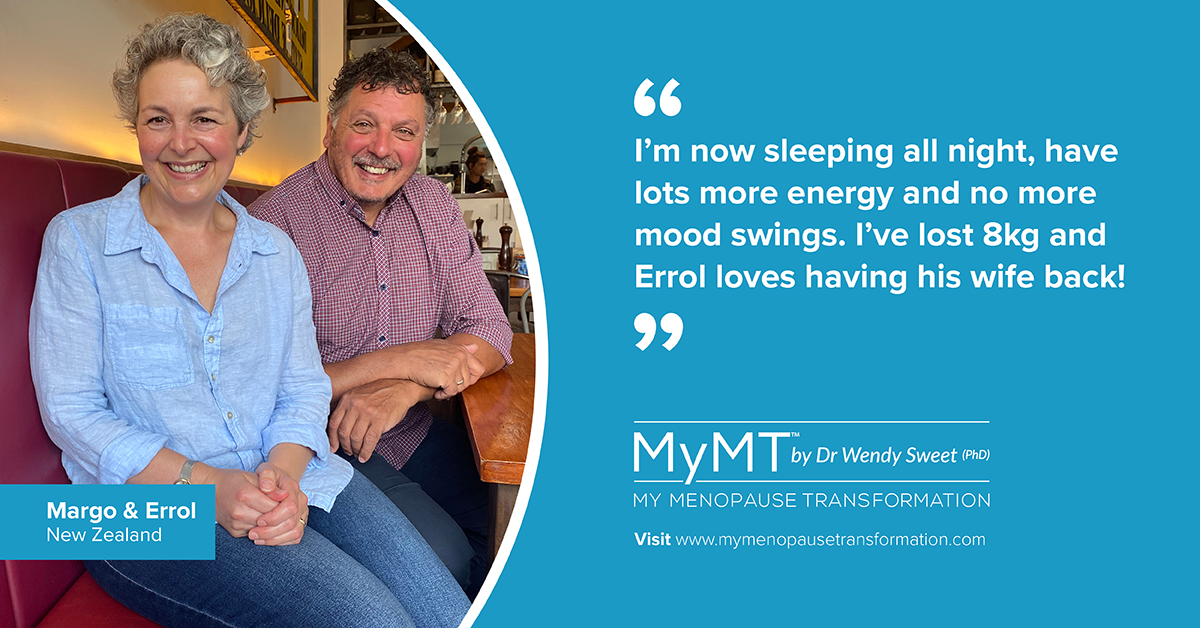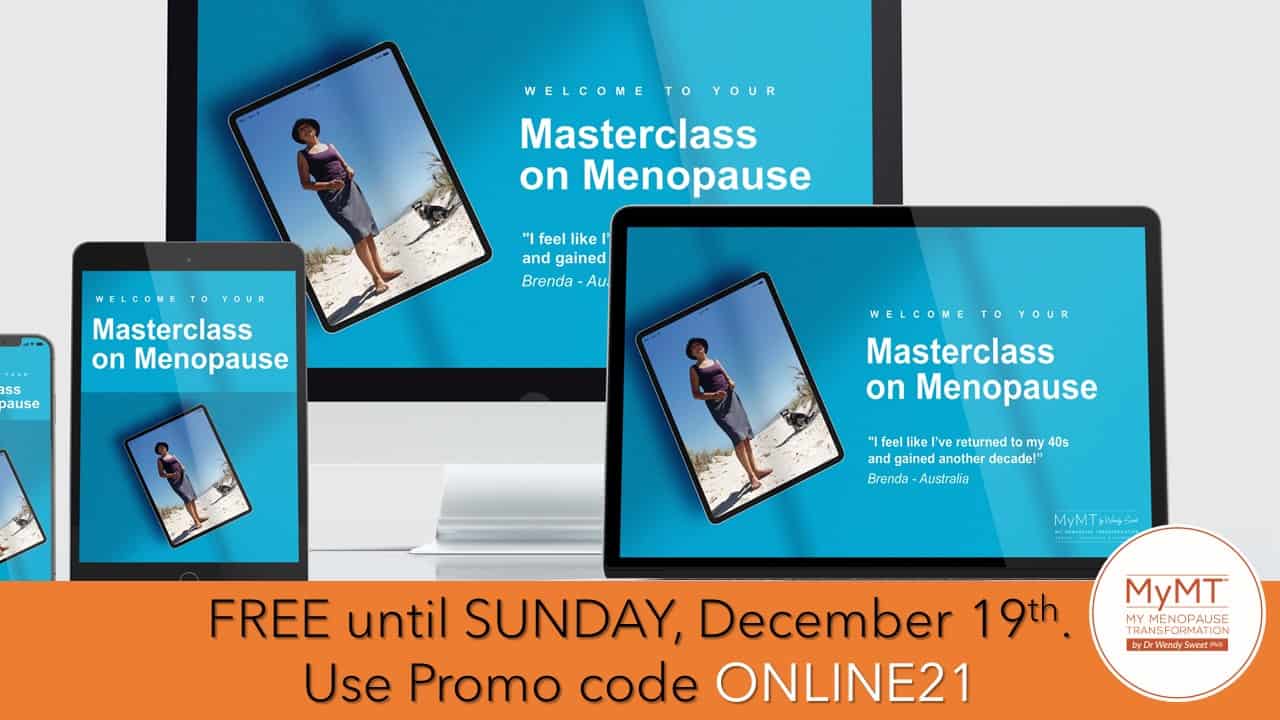‘Do most marraiges end during our menopause years? (Apparently yes they do!) and ‘How do I get my husband to understand menopause?’ (Education!) – according to google, these are the two most frequently asked questions in relation to partner/ spouse’s reactions to menopause.
I was thinking about this very topic last week. Margo and Errol had come into the cafe that morning. She approached my table – “Wendy, is that you?” was the query. There was Margo standing there with hubbie, Errol. Once introductions were made, he reached over to give me a hug. “I’ve got my wife back thanks to your programme” he beamed. Margo just laughed. When I enquired what had changed, she mentioned that she was now sleeping and had more energy and had lost track of how much weight she had lost, “probably about 8kg” she said.
As I chatted away to them both, we all agreed that none of us really knew about menopause, especially Errol. As a South African living in New Zealand, he acknowledged that even over there, it wasn’t a topic of male-discussion.
That’s what made me curious about men and menopause. Their reactions, attitudes and experiences. Thank goodness for qualitative research to help me explore this topic and in the lead up to Christmas and New Year, I thought you may be interested …. and perhaps your partner/spouse might have time to listen to my Masterclass on Menopause with you. [I’ve made it free to you (and him) for the next 5 days, when you apply the promo code ONLINE21.]
It’s quite extraordinary that it’s taken until quite recently that studies have been published exploring how our spouse’s react to menopause. “Challenges faced by women during their menopausal phases do not only revolve around them, but also their respective spouse” states a 2018 report, which explored spouse’s (male) reactions to menopause changes in their wives. [Hassan, Hussain, Sulaiman, Nor, & Kadir, 2018].
However, male spouses’ perceptions of and attitudes toward female menopause are important factors affecting a menopausal women’s quality of life as well as the stress she is feeling about her symptoms. From my own experience, I would wholeheartedly agree. Do you?
I found that my own symptoms were distracting (especially my weight gain) and it was difficult to discuss exactly how I was feeling with hubbie. At the time, I didn’t have any solutions except to go on HRT (made me feel worse) and spend lots of money on supplements – most only worked for a short time. The day that hubbie ordered Sleep-drops for me, was the day that I realised how much my lack of sleep, low energy and mood swings were impacting the family as well. Thank goodness for my research.
Do you know what your spouse is thinking about menopause? And does he/ she know what you are going through? Or are you, as I did, hiding how you are really feeling? – If you are, then don’t worry, according to the research, you aren’t alone it seems.
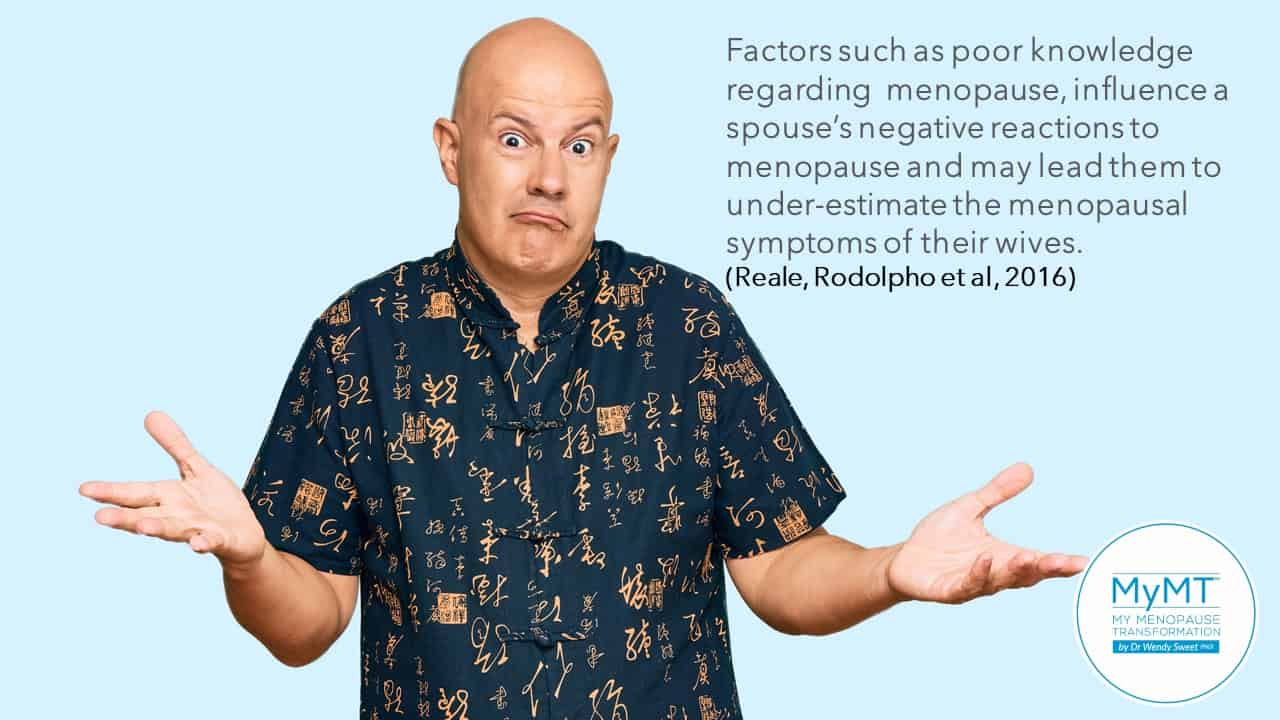
More than 50% of middle-aged women experience frequent menopuase-related symptoms (Pajalic & Raboteg-Saric, 2020). That’s why I believe that the Men’s perception and Attitudes Toward mEnopause (MATE) survey conducted in America offers an important contribution to our understanding of what our partners may be experiencing too. This survey was designed to gauge men’s awareness of menopausal symptoms and understanding of menopause and its treatment options, evaluate the impact of menopausal symptoms on men, and determine the influence of men on their partner’s menopausal symptom management. [Parish, Faubian et al, 2019].
The results are similar to another study conducted in Malaysia exploring similar issues with Malaysian spouses. (Intan, Hussain & Kadir, 2019). Both studies report that the menopause experience of their wives, also affects them.
The MATE survey reported that 63% of survey respondents responded that their wives symptoms had personally affected them and that this placed an emotional strain on their relationships – these were reported as arguments, felt unappreciated, increased tension. Furthermore, there was also reduced frequency of sex/intimacy and their wive’s symptoms contributed to their own trouble sleeping.
Some men also noted that it was upsetting or frustrating to see their partners going through this transition. Most men affected by menopausal symptoms believed the symptoms had a very or somewhat negative impact on them, their relationships or their partners (70%). Only 10% of men in the MATE-study thought the symptoms had a positive influence on them, their relationships, and partners. Interesting – and why am I not surprised!
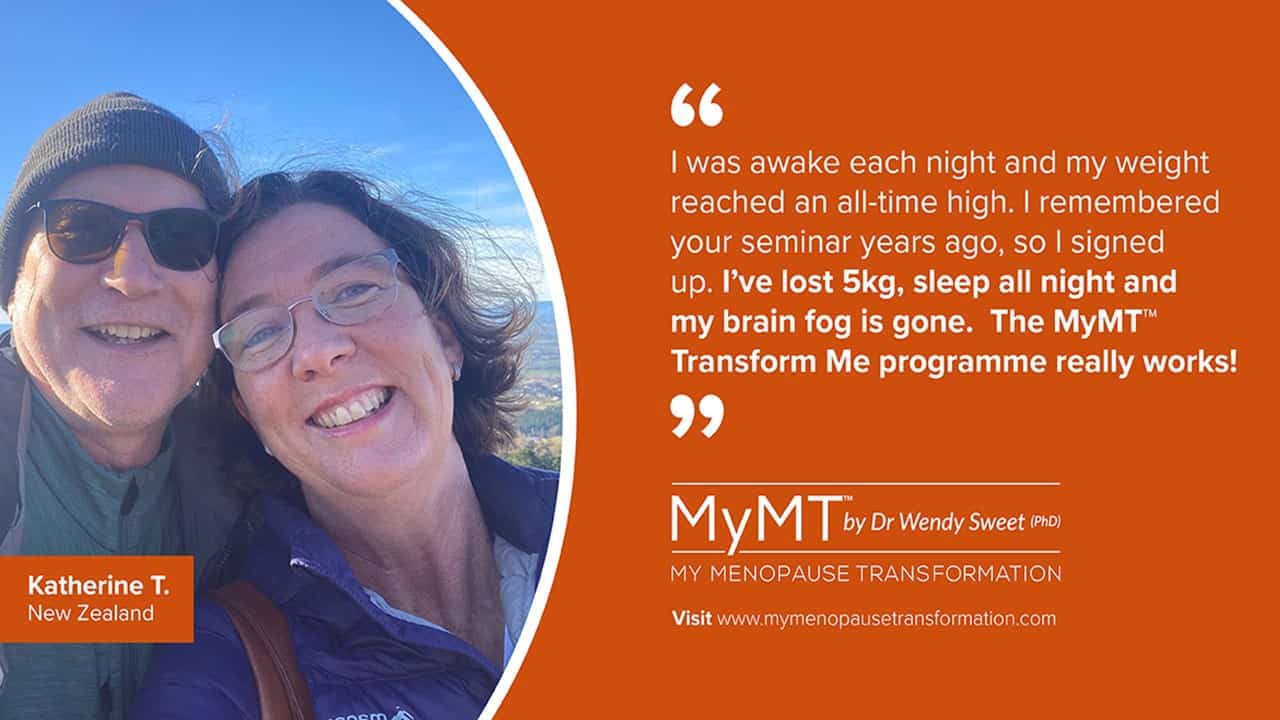
What were the main reasons given by men for how menopause changes in their wives was affecting them?
The most frequnetly reported reason for the men having negative reactions towards their wives symptoms, was simply ‘lack of knowledge’.
In the MATE study, the researchers found that whilst men were aware of their partners’ symptoms, they didn’t consistently relate these to menopause! And it seems that marketing isn’t quite reaching the men either – just over half of the men in the study knew that in general, medical treatments were available for menopausal symptoms, however, their knowledge of what these specific treatment options were, was limited. (Parish, Faubion et al, 2019).
Other factors that were culturally driven also impacted the men’s reactions as well. In some of the studies, this cultural influence went both ways – i.e. the women didn’t want to talk to their spouse about their symptoms because they were embarrassed and/or the men didn’t talk about their wive’s symptoms, because they didn’t know enough about them. It was a topic that is hard to talk about, especially when, from a cultural perspective, talking about personal concerns isn’t customary. (Dillaway, 2008; Intan et al, 2019). Dillaway’s research talking to wives about how they felt about spouse involvement in their menopause transition was enlightening. Many of the wives she spoke to felt unsupported and subsequently this impacted their emotional distress.
It’s tough out there isn’t it?
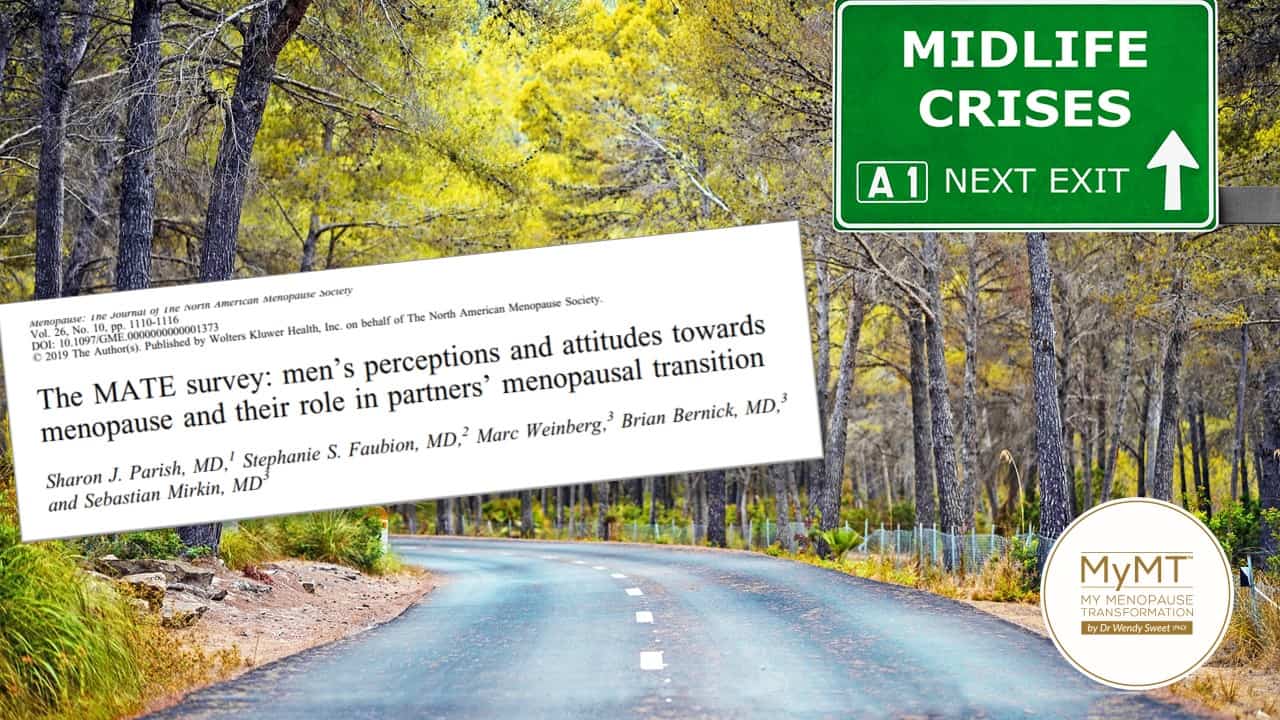
Reading all of this research got me wondering if your partner/ spouse would be interested in watching the Masterclass on Menopause with you? If so, then I’ve made it FREE for the next 5 days!
With most of the studies and even the World Health Organisation mentioning that education is the step in the right direction for partner’s/ spouse to better understand menopause, I would love you to get my Masterclass on Menopause webinar as my complimentary gift to you and your spouse to watch. The details are below.
When I was taking my live events and travelling throughout Australia, New Zealand and the United Kingdom before the pandemic took over, I often got women emailing me beforehand to ask if it was OK if their partner came along to the event. I would always try to give the partner a complimentary ticket, because I so believe that a problem shared is a problem-halved.
My own husband was very confused about menopause, as was I and yes, there were times when I felt unsupported as well. That’s why I’m passionate about educating men as to what is really going on at this life stage. I especially want your spouse and other members of your family to know that there are some lifestyle changes you can make, to help you with the management of your symptoms. I introduce you to these in the Masterclass.
I know myself that we often get so focused on looking after the family and providing for them, that our own needs go to the bottom of the heap. But lifestyle behaviour-change research for middle-age women consistently reports that if we are going to make changes to our diet, exercise, stress levels and sleep patterns, we must get support in the home (Anderson, 2008). This is imperative!
As my support for you (and your partner/spouse), after a very tough year, then please accept my FREE Masterclass on Menopause (usually NZ$15) for you both to listen to. Whilst it’s 2 hrs long, you can ‘pause’ me anytime and you have access for 3 months. But it’s only available free until Sunday, December 19th, so don’t delay. You just apply the promo code ONLINE21
Merry Christmas and Happy Holidays from me to you. I know it’s been a tough year on so many fronts for many of you, as it has been for many women on the MyMT™ programmes, so my thoughts are with you.
Dr Wendy Sweet (PhD)/ Founder of MyMT™/ Member: Australasian Society of Lifestyle Medicine.
References:
Anderson, R. (2008) Exercise and dietary behaviour change in a sample of midlife Australian women. PhD by Publication, Queensland University of Technology.
Ayers B., Forshaw M., Hunter M. (2010). The impact of attitudes towards the menopause on women’s symptom experience: a systematic review. Maturitas. 65(1):28-36. doi: 10.1016/j.maturitas.2009.10.016. Epub 2009 Dec 1. PMID: 19954900.
Dillaway H, Byrnes M, Miller S, Rehan S. (2008). Talking “among us”: how women from different racial-ethnic groups define and discuss menopause. Health Care Women Int. 29(7):766-81. doi: 10.1080/07399330802179247. PMID: 18663634.
Hassan, I. I., Hussain, N. H. N., Sulaiman, Z., Nor, M. Z. M., & Kadir, A. A. (2018). A Review of Spouse’s Reactions to Menopausal-Related Changes. International Journal of Academic Research in Business and Social Sciences, 8(6), 1224–1236.
Pajalić, Z., & Raboteg-Šarić , Z. . (2020). Determinants of menopause-related symptoms in women during the transition to menopause and the postmenopausal period – A systematic literature review. Journal of Health Sciences, 10(1), 1–33. https://doi.org/10.17532/jhsci.2020.885
Rodolpho JR, Cid Quirino B, Komura Hoga LA, Lima Ferreira Santa Rosa P. (2016). Men’s perceptions and attitudes toward their wives experiencing menopause. J Women Aging. 28(4):322-33. doi: 10.1080/08952841.2015.1017430. Epub 2016 Apr 4. PMID: 27044440.
Parish, SJ. Faubion, S., Weinberg, M., Bernick, B., & Mirkin, S. (2019). The MATE survey: men’s perceptions and attitudes towards menopause and their role in partners’ menopausal transition, Menopause: 26(10), 1110-1116 doi: 10.1097/GME.0000000000001373
